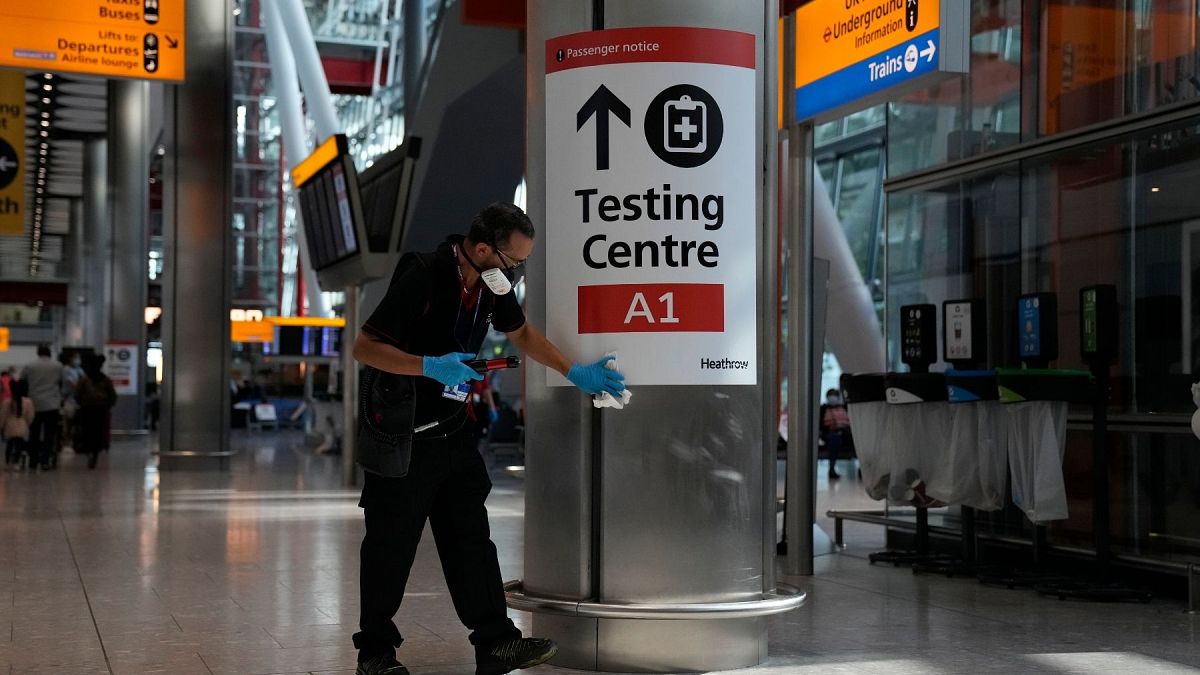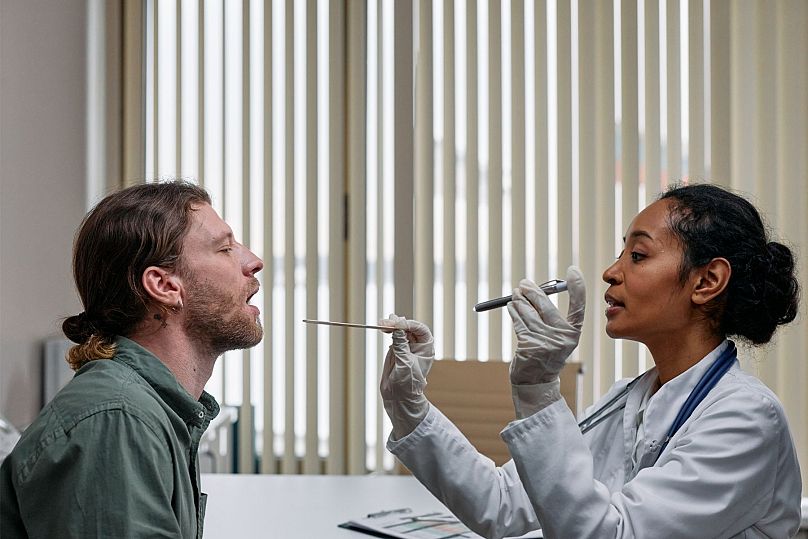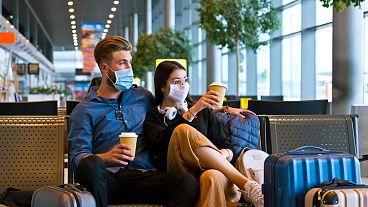All UK arrivals have to show a negative COVID-19 test on arrival and do a PCR test on or before day 2.
There are now new rules for pre-departure testing in the UK so this article is out of date. Find up to date information about the UK's travel restrictions here.
In response to the Omicron variant, the UK now requires all travellers to show a negative COVID-19 test on arrival. This can be an antigen or a PCR test, but it must have been done in the 48 hours before departure.
All travellers must do a pre-departure test, regardless of vaccination status or where they have travelled from. The rules are different for red list arrivals.
The announcement was made by UK Health Secretary Sajid Javid on Twitter.
This is in addition to doing a PCR test on or before the end of day 2.
In the latest update to the UK travel rules, children aged 12 to 15 years old are being issued with NHS COVID passes for holidays abroad.
UK travel rules for pre-departure tests
In a statement the UK government said, "From 4am on Tuesday, anyone wishing to travel to the UK from countries and territories not on the red list must...show proof of a negative PCR or lateral flow pre-departure test, taken no earlier than 48 hours before departure. This applies to vaccinated passengers and children aged 12 and above."
When is it best time to take a pre-departure test?
The advice is to take the test as close to your departure as possible. This is because omicron has a "reduced incubation period."
However, it must be done in the 48 hours before your departure time.
Who enforces testing rules?
It is the responsbility of airlines to check all testing rules have been followed. Anyone who tries to check in for their flight without a negative test will be refused boarding.
The government says, "Airlines will be required to check for pre-departure tests alongside a completed passenger locator form, and passengers will not be allowed to board a flight without providing evidence of a negative test result.
Why has this rule been introduced?
The testing requirements are in response to the omicron COVID-19 variant which has so far been detected in 38 countries and has been labelled by the World Health Organization as a 'variant of concern' which poses a "very high" global risk.
New data from the UK's Health and Security Agency (UKHSA) has shown that "the window between infection and infectiousness may be shorter for the omicron variant."
This means that COVID-19 is more likely to show up on pre-departure tests. So by making all passengers do them, it should lower the number of omicron cases coming into the UK.
What you need to know about day 2 tests - and when they must be booked
As well as doing a pre-departure test, you must do another test before the end of your second day in England. This rule has been in place since 30th November, soon after the omicron variant was first detected.
Here's the details:
- Everyone arriving into the UK, whether they are vaccinated or not, must do a day 2 test.
- The rules are different if you are flying from a red list country, so check the status of the country you are arriving from.
- Unlike the pre-departure test, the day 2 test must be a PCR test.
- After doing the test, you must self-isolate until you have received a negative result.
- You will need your booking reference for your passenger locator form, which can be filled in up to 48 hours before your flight.
- Therefore, you must book your day 2 test before you arrive at the airport to take your flight to the UK.
The trick most people don't know about
Despite the name, you can actually do the test on or before day 2. This rule is stated on the UK government website here.
This means that you can get tested as soon as you land in the UK. Most airports have testing centres, and getting it done when you arrive means you don’t need to worry about doing it on your actual day 2. You could also do it on the way home from the airport, or the next day. But remember you must self-isolate and only leave where you are staying for essential reasons such as testing.
Don’t forget: day 0 is the day you arrive into the UK, then the next day is day 1, and so on.
How do I get a day 2 test?
There are lots of different companies that you can book a test through online. But not all test providers are created equal.
In terms of private providers, some companies offer at-home options sent by mail, or in-person testing. The government has a handy guide about which test might be right for you here.
Remember to make your online booking in time to put the booking reference, which you'll receive by email, on your passenger locator form.
Which testing companies should you avoid?
There are company you might want to avoid, for now at least.
On September 24th, the UK Competition and Markets Authority revealed they are investigating Dante Labs for not delivering tests or test results on time or at all, not responding to customer complaints, refusing or delaying to pay refunds and having unfair terms and conditions. The results of their investigation will be revealed in due course.
Don't worry, however, if you are already in the process of using Dante for testing. Your results will still be accepted as valid.
The other testing company under investigation is Expert Medicals.
They are similarly being investigated for not sending out tests and results, not responding to customer complaints and refusing to issue refunds when due.
You can find the list of government-approved testing providers here.
Children issued with NHS COVID passes
As of 13 December, NHS COVID passes are being rolled out to 12 to 15 year olds in the UK following the expansion of the vaccination programme to children.
There's still no need for children to show certificates at the UK border (or anywhere else in the UK) but it should help with overseas travel in 2022. Spain and Canada, for example, are among countries where this age group must be fully vaccinated to gain entry, avoid isolation, and access some venues.
Proof of vaccination will initially be provided in letter form - with an internationally recognised barcode - before the digital pass goes live on the NHS App early next year. More information, including on how to apply for the letter, can be found on the government website here.
Frequently Asked Questions
Many of our readers have questions about the UK's travel requirements.
We put these questions to the government departments responsible for the rules. Their answers are below.
When are these rules in place until?
The UK government says, "These are temporary measures that have been introduced to prevent further Omicron cases from entering the UK, and will be examined at the three-week review point on 20 December."
I wasn’t asked for proof of a negative test, PLF or day 2 test booking when I arrived in the UK. Who is responsible for checking this?
According to the government, airlines are responsible for checking that passengers are following the guidance.
What am I supposed to do with the results of my day 2 test if they are negative?
"There is no specific guidance on reporting as this is done by laboratories, but passengers must self-isolate for 10 days if they receive a positive test result," says the spokesperson.
Does this apply to travellers entering the UK from Ireland?
Irish and British citizens travelling between the UK and Ireland do not count as 'international travellers' because of the Common Travel Area.
At the moment, this guidance has not changed and British or Irish citizens travelling from Ireland into the UK are not required to fill out a Passenger Locator Form (PLF) or take a COVID-19 PCR test.
However, non-British and non-Irish citizens entering the UK are likely to still need a PLF and a PCR test.
The guidance around this is still changing, so we recommend contacting your travel provider for further clarity.
I'm only in the UK for less than 48 hours - do I still need to book a day 2 test?
Yes - if you're travelling from abroad you will still need to book a day 2 test, even if you are in the UK for less than two days.
You will need to fill out a Passenger Locator Form (PLF), even for a short trip, which requires a day 2 test booking number.
Do I need to book a day 2 test if I am only transferring through the UK?
If you are only coming to the UK to transfer to another country, you will not need to book a day 2 test - as long as you are only in the UK for transit purposes.
If you remain 'airside' only, and do not pass through border control, then you do not need to fill out a Passenger Locator Form (PLF).
If you are a 'landside' transit, and need to pass through border control, you will need to fill out a PLF but still do not need to book a day 2 test.
Instead you will do the following on the form:
- select ‘Stay in the UK’ under the Your travel plans section
- reply ‘I will be travelling for an exempt reason’ to the question about whether you are required to self-isolate on arrival
- select the Exemption options, and then select ‘Transit Exemption’
These rules only apply to fully vaccinated travellers who have not been in red-list countries in the past 10 days. For more information, click here.
Do children need to take a day 2 test?
Yes, children aged 5-17 need to take a day 2 PCR test when arriving into the UK - regardless of whether or not they are vaccinated.
Children aged 17 and under do not need to quarantine, however.
There is more information on travelling with children here.
Who can I contact for more information?
The UK’s Citizens Advice Bureau can provide support via their website.
You can also email dhsctesttrace.customerfeedbackteam@nhs.net for more advice.




